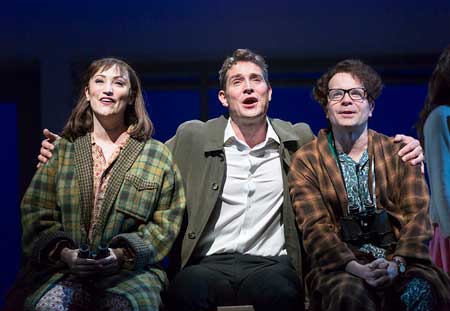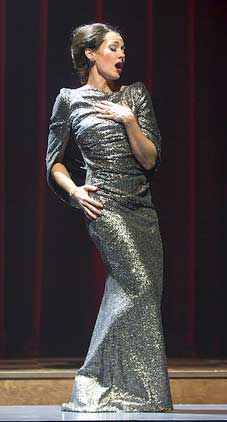Musical (1981)
Music and lyrics by Stephen Sondheim
Book by George Furth
Based on the original play by George S, Kaufman and Moss Hart
Directed by Maria Friedman
Music Director and Conductor: Matthew Stern
Huntington Theatre Company
Boston University Theater
Symphony Hall area, Boston
September 8 – October 15, 2017
With Mark Umbers (Franklin Shepard), Damian Humbley (Charles Kringas), Eden Espinosa (Mary Flynn), Aimee Doherty (Gussie Carnegie), Jennifer Ellis (Beth), Christopher Chew (Joe Josephson), Amy Barker (Scotty/Mrs. Spencer, Auditionee), Caleb Damschroder (Ensemble), Bransen Gates (Ensemble), Rebecca Gibel (KT), Damian Humbley (Charles Kringas), Morgan Kirner (Newslcaster/Waitress/Auditionee), Jessica Kundla (Meg Kincaid), Cameron Levesque (Frank Junior – rotates), Carla Martinez (Ensemble), Brendan O’Brien (Frank Junior – rotates), Maruice Emmanuel Parent (Bunker, Newscaster, Reverend), Robert Saoud (Terry, Mr. Spencer), Pablo Torres (Ru, Photographer), Patrick Varner (Tyler, Make-up Artist), Craig Waletzko (Jerome), Ceit M. Zweil (Dory, Evelyn)

Mark Umbers as Franklin Shepard
Damian Humbley as Charles Kringas
in “Merrily We Roll Along”
© Photo: T. Charles Erickson
Courtesy of Huntington Theatre Company
In the earlyish 1980s Microsoft piloted a little-appreciated graphical operating system for PCs called Windows. It stumbled along for seven or eight years before it finally took off and became the system that a large percentage of computer users now have on their desktops. Hanging in with it, Microsoft helped it to realize its potential.
Something analogous seems to have happened with this great Sondheim musical which, when it appeared on Broadway in 1981, closed after just 16 performances. Thanks to Sondheim’s dedication to the musical, it was reconceived and restaged several times over the coming decade, in La Jolla and in London, to considerably more success. The 1992 London production starred Maria Friedman as Mary, and she has now come to direct this strikingly good Huntington production of the once failed, and now celebrated, Sondheim effort.
The story of three friends and colleagues in show business, the book is structured in chronological inversion – we see the tragic finale before we see what precedes it – and the play works backwards until its very romantic and youthful beginnings.
The jaded and cynical Frank (Mark Umbers), a talented composer turned Hollywood film producer, product of several failed relationships, and alienated from his dearest friends and colleagues, forms the center of the initial scene. As things work backwards we see his involvements with Charlie (Damian Humbley), his lyricist colleague, and with Mary (Eden Espinosa), a writer of plots and books. We also get to see Frank’s marriage to aging star Gussie (Aimee Doherty) crumbling, and then get to see how, earlier on, Gussie steals him away from Beth (Jennifer Ellis) whom Frank marries in his youth, which we then see several scenes later.

in “Merrily We Roll Along”
© Photo: T. Charles Erickson
Courtesy of Huntington Theatre Company
Sondheim and George Furth, the author of the book, took the original idea of the reverse chronology from Kaufman’s and Hart’s original 1934 play of the same name, which was more about the political disillusionment of the time, and applied it to the postwar decades during which the protagonists of the revisioned version come into their own as artists.
The music to this show is wonderfully intricate, and manages, as with the best of Sondheim’s musicals, to combine an appealing show-bizziness with – at least at times – innovative musical complexity. There are places where the musical layers are quite dense and intricately interlace several sets of themes. The score, by virtue of the reverse chronological text, makes use of the interesting technique of having full reprises precede the introductions of echoed songs. One hears, in all parts of the show, different pieces of songs that have come “before” showing up somewhat unexpectedly. The technique is interesting, offbeat, and delightful.
There is a passel of great songs in this show. The main theme, Merrily We Roll Along, is reprised at every scene interval. Not A Day Goes By is a magnificently poignant ballad sung beautifully by Jennifer Ellis as Beth at the time of her departure from Frank. And there are plenty more.
The orchestra, under the baton of music director Matthew Stern, is truly top notch. It executes the often challenging score with precision and verve.
The main dramatic trio of this production, Mark Umbers, Damian Humbley and Eden Espinosa, playing Frank, Charlie and Mary, are wonderful together. All of them sing excellently and are convincing actors. I was most struck by Damian Humbley’s vocal pizzazz, but it was only a highlight in a landscape of riches.
Playing Frank’s two wives are Aimee Doherty (Gussie) and Jennifer Ellis (Beth), two of Bosotn’s leading musical actresses, and both give excellent performances. Doherty really tears it up in her solo performance of ‘Musical Husbands’ Finale which opens the second act.
Christopher Chew does a convincing job as the earthy and resigned Joe, the theatrical promoter and the husband of Gussie, an atypical portrayal for Chew, but one which he carries off admirably well.
The company is huge – over twenty – and the collective effect is stellar. The vocal choruses are pitch perfect and the choreography by Tim Jackson, who did it for the successful London production, has done it here again.
Apparently when Sondheim saw the London production after so many years of wading in the echoes of its failure in New York, he cried. In the current case, the vision and commitment of director Maria Friedman draws this resurrected and once almost abandoned musical back into the swirl of creative invention, and we may cry for joy that it has come our way with such style, verve and conviction.
– BADMan
Leave a Reply